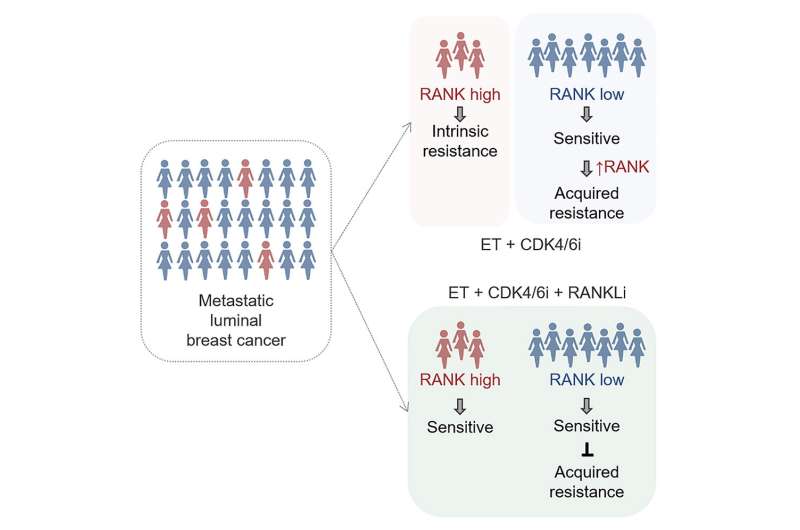This article has been reviewed according to Science X's editorial process and policies. Editors have highlighted the following attributes while ensuring the content's credibility:
fact-checked
peer-reviewed publication
proofread
Combination therapy can prevent resistance to treatment in hormone responsive metastatic breast cancer patients

Breast cancer is a heterogeneous disease, but 70% of cases are characterized by the presence of hormone receptors for estrogen, progesterone, or both. The first line of treatment for these patients, when presenting with metastatic disease, is endocrine therapy in combination with CDK4/6 inhibitors, but the majority develops resistance to treatment within two years.
Now, a new study led by Sandra Casimiro, staff scientist at the Instituto de Medicina Molecular João Lobo Antunes (iMM; Portugal), and Luís Costa, principal investigator at the iMM and oncologist at the Hospital Santa Maria (Portugal), and published today in Cell Reports Medicine, found a promising molecular target in cancer cells that could be used in combination with the standard care to avoid resistance to treatment in metastatic breast cancer.
"Currently, the first-line of care treatment for metastatic luminal breast cancer, which expresses receptors for estrogen and/or progesterone, is the combination of endocrine therapy with CDK4/6 inhibitors. Although this treatment was a life-changing discovery for breast cancer patients, around 20% are irresponsive and the majority of the ones who respond to treatment becomes resistant within 2 years," says Luís Costa, oncologist and co-leader of the study.
"We studied the possibility that the RANK signaling pathway, which is an important mediator of breast cancer aggressiveness in triple negative cancer, could be relevant in the resistance to treatment in the case of luminal breast cancer," explains Sandra Casimiro, co-leader of the study and researcher at iMM.
"In this study, we found that high levels of RANK in cancer cells are associated to resistance to treatment with CDK4/6 inhibitors. By analyzing a dataset of human samples of tumors from patients treated with CDK4/6 inhibitors, we found that the levels of RANK in the tumor increase overtime during the duration of the treatment. This suggests that RANK can be implicated in acquired resistance as well," continues Sandra Casimiro.
"Having this in mind, we tested in vitro and in mouse models if inhibiting the RANK pathway in combination with the current therapy would improve treatment efficacy, and found that the cancer cells respond better to the treatment in the presence of RANK ligand inhibitors."
"The pharmacological inhibition of RANK pathway is already used in the clinical setting. Our study suggests that combination therapy with RANK ligand inhibitors and the current standard care for metastatic luminal breast cancer could improve the outcome in non-responsive patients and avoid or delay the resistance to treatment," concludes Luís Costa, on the clinical relevance of these findings.
Upon clinical studies, RANK ligand inhibition could represent a promising add-on to the current standard care treatment for hormone responsive breast cancer.
More information: Sandra Casimiro, Co-targeting RANK pathway treats and prevents acquired resistance to CDK4/6 inhibitors in Luminal breast cancer, Cell Reports Medicine (2023). DOI: 10.1016/j.xcrm.2023.101120. www.cell.com/cell-reports-medi … 2666-3791(23)00248-3


















